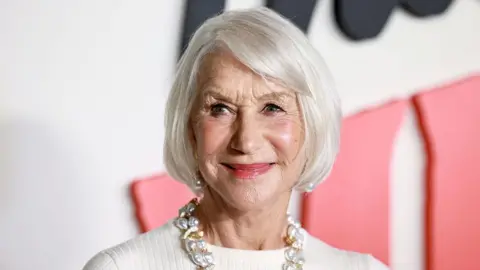In a recent interview with *Saga Magazine*, esteemed actress Dame Helen Mirren has voiced her perspective on the iconic character of James Bond, asserting that the character should remain a man. Despite her strong feminist beliefs, Mirren expressed, “you can’t have a woman. It just doesn’t work. James Bond has to be James Bond, otherwise, it becomes something else.” These remarks have reignited discussions about gender representation in film, particularly in long-established franchises like Bond.
The forthcoming installment of the Bond series, produced by Amazon MGM Studios, will mark the 26th film in a storied franchise that continues to evolve. Notably, the acclaimed creator of *Peaky Blinders*, Steven Knight, has been tapped to pen the new script. Although there has been a promise to deliver a “fresh” vision for the Bond saga, the producers remain committed to honoring the legacy of the character that has been deeply ingrained in popular culture since Ian Fleming’s novels first appeared in the 1950s.
At 80 years old, Mirren is not only a remarkable actress but also a current star opposite former Bond actor Pierce Brosnan in the highly anticipated film adaptation of Richard Osman’s *The Thursday Murder Club*, where she plays a retired spy. Brosnan, who played 007 in four films from *GoldenEye* to *Die Another Day*, also shared Mirren’s view on the ongoing discussion around Bond’s gender, stating he believes a male actor should continue in the role to rejuvenate the character while respecting the original portrayal.
Mirren’s previous statements highlight her awareness of the complexities surrounding Bond’s character. She has referred to the creation of James Bond as “born out of profound sexism,” acknowledging the historical implications of such a character while also recognizing the essential role women have played in espionage and intelligence work, roles often overshadowed in traditional narratives.
Adding to this dialogue, Halle Berry, who starred alongside Brosnan in *Die Another Day*, has also expressed skepticism regarding a female Bond. Speaking at the Cannes Film Festival in May, Berry remarked, “In 2025, it’s nice to say, ‘Oh, she should be a woman.’ But, I don’t really know if I think that’s the right thing to do.” This encapsulates a broader ambivalence shared by many in the film industry about the reimagining of classic male characters as female leads, often resulting in debates on authenticity versus modern representation.
As the franchise transitions following the sale of creative control from the Broccoli family to Amazon for a staggering $1 billion, speculation regarding casting has intensified. Actors like Aaron Taylor-Johnson and James Norton are currently regarded as frontrunners to take over the role of 007. The anticipation surrounding who will embody Bond next encapsulates not only the desires of fans but also the cultural shifts influencing cinema at large.
While no definite release date for the next Bond film has been established, the interest and discussion it invokes highlight the tension between traditional elements of storytelling and the evolving expectations of contemporary audiences. Acknowledging the enduring legacy of James Bond encapsulates the challenge of adapting to new norms without alienating long-time fans.
In sum, Helen Mirren’s recent statements reflect a thoughtful consideration of the implications of gender in iconic roles, emphasizing that while discussions about representation are vital, they must also align with the essence of established characters. The continued evolution of the James Bond franchise remains a focal point for broader discussions on how gender dynamics are portrayed in major film narratives today.












